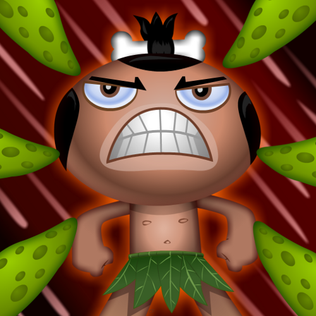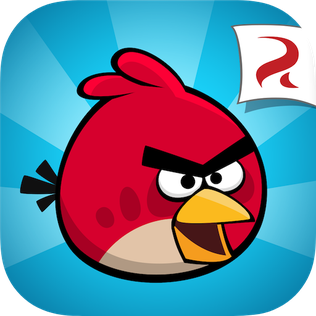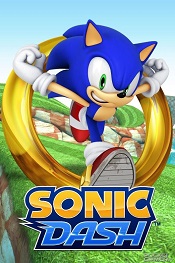
Sonic Jump is a 2005 vertical platform game developed by AirPlay and Sonic Team, and published by Sega for the digital distribution service Sonic Cafe, initially only available in Japan for mobile phones before being ported to iOS and Android and released in other regions in 2007. Unlike other games in the series, Sonic Jump doesn't involve running from left to right, but instead, Sonic automatically jumps up the screen, with the player needing to tilt the phone to move him from left to right. The original game's graphical style is based on the Sonic Advance series, which had ended shortly before Jump's release.

Pocket God is a simulation game developed by Bolt Creative, in which the player manipulates an island and its inhabitants. It was released for the iPad, iPhone, and iPod Touch on January 9, 2009, and released for Verizon Wireless on September 1, 2010, Android on December 1, 2010, and Windows Phone on December 4, 2010. The Facebook version was released December 23, 2010.

Doodle Jump is a platforming video game developed and published by Croatian studio Lima Sky, for Windows Phone, iPhone OS, BlackBerry, Android, Java Mobile (J2ME), Nokia Symbian, and Xbox 360 for the Kinect platform. It was released worldwide for iPhone OS on April 6, 2009, and was later released for Android and Blackberry on March 2, 2010, Symbian on May 1, 2010, Windows Phone 7 on June 1, 2011, and August 21, 2013, on Windows Phone 8. It was released for the iPad on September 1, 2011. Since its release, the game has been generally well received. The game is currently available on nine platforms.

Edge is a puzzle-platform game developed by Mobigame for PC and iOS devices. The objective is to guide a rolling cube through maze-like levels and reach the goal. Originally released on the App Store in December 2008, it has been removed and re-added to the store multiple times due to a trademark dispute with Tim Langdell of Edge Games, concerning the use of the word "Edge" in the title. This had caused the game to be briefly released as Edge by Mobigame and Edgy, before ultimately returning to the App Store under its original name in January 2010. The game was released on multiple platforms including mobile phones, PlayStation Portable, Windows, Mac OS X, Linux, Android, Wii U, and Nintendo 3DS. It was released on Steam in August 2011 by publisher Two Tribes.

Angry Birds is a 2009 casual puzzle video game developed by Finnish video game developer Rovio Entertainment. Inspired primarily by a sketch of stylized wingless birds, the game was first released for iOS and Maemo devices starting in December 2009. By October 2010, 12 million copies of the game had been purchased from the iOS App Store, which prompted the developer to design versions for other touchscreen-based smartphones, most notably Android, Symbian, Windows Phone, and BlackBerry 10 devices. The series has since expanded to include titles for dedicated video game consoles and PCs. A sequel, Angry Birds 2, was released in July 2015 for iOS and Android. Around April 2019, the original game was removed from the App Store. A paid recreation of the game's content from 2012 was released as Rovio Classics: Angry Birds on March 31, 2022, but later on, Rovio mentioned that they were removing it from the Google Play Store on February 23, 2023, and retitling it as Red’s First Flight.

Fruit Ninja is a video game developed by Halfbrick originally released on August 12, 2010. In the game, the player must slice fruit that is thrown into the air by swiping the device's touch screen with their finger(s) or the player's arms and hands, and must not slice bombs. It features multiple gameplay modes, leaderboards and multiplayer.

BlueStacks is an American technology company recognized for its creation of the BlueStacks App Player and other cloud-based cross-platform products. The BlueStacks App Player enables the execution of Android applications to run on computers running Microsoft Windows or macOS. The company's establishment traces back to 2009, founded by Jay Vaishnav, Suman Saraf, and Rosen Sharma.

Temple Run is a 3D endless running video game developed and published by Imangi Studios. The player controls an explorer who has obtained an ancient relic and runs from demonic monkey-like creatures chasing him. The game was initially released for iOS devices on August 4, 2011, and later ported to Android systems and Windows Phone 8.

Jam City, Inc. is an American video game developer based in Culver City, California. The company was founded in 2010 by Chris DeWolfe, Colin Digiaro, Aber Whitcomb, and Josh Yguado. Jam City has nine studios located in the United States, Canada, South America, and Europe. As of 2021, it employs 825 people. Netmarble is the largest shareholder in Jam City. As of 2021, Jam City's games have 31 million monthly active users and 1.3 billion total downloads.
Game Insight is a Lithuanian video game developer and publisher of free-to-play mobile games and social-network games, headquartered in Vilnius, Lithuania. The company was founded in 2009 in Moscow. Game Insight is known for its free-to-play games for iOS, Android, Windows Store, such as Paradise Island, Airport City, The Tribez. Game Insight developed the first hidden object game for Facebook, Mystery Manor. Game Insight's portfolio includes more than 45 free-to-play games, including mobile games for Google Play, App Store, Windows Store, Amazon AppStore, and games for social networks, such as Facebook, localized in 10 languages and played in 218 countries of the world. The Company employs more than 500 people worldwide.

Pocket Planes is a business simulation video game developed by NimbleBit for iOS. It was initially released on 14 June 2012. In October 2012, the game became available on the Mac App Store. An Android version, ported and published by Mobage, was released on 22 September 2012. The game was removed on 24 September 2015 from the Google Play Store, however was re-released 17 March 2022. The game is still available on iOS App Store in selected regions. An update to the iOS version is also planned and will see the game available again in all countries.
Pot Farm is a farming simulation social network game developed by Brain Warp Studios and owned by East Side Games. Gameplay involves planting and harvesting different strains of cannabis and manufacturing cannabis-based food items. Many of the plants, quests and achievements are named after elements of cannabis subculture.

Angry Birds Star Wars was a puzzle video game, a crossover between the Star Wars franchise and the Angry Birds series of video games, launched on November 8, 2012, first for Windows, iOS, and Android devices, later also to Mac and BlackBerry. The game is the sixth Angry Birds game in the series. The characters are copyrighted from George Lucas's double-trilogy. On July 18, 2013, Rovio announced that Angry Birds Star Wars would be heading for the PlayStation 3, PlayStation Vita, Xbox 360, Wii, Wii U, and the Nintendo 3DS on October 29, 2013, in conjunction with Activision. As of August 2013, the game has been downloaded over 100 million times on its various platforms. The game is a launch title for the PlayStation 4 and Xbox One.

Sonic Dash is a 2013 endless runner mobile game developed by Hardlight and published by Japanese game studio Sega. It is Hardlight's second Sonic the Hedgehog game, the first being 2012's Sonic Jump. The game was released in March 2013 for iOS, November 2013 for Android, and December 2014 for Windows Phone and Windows, along with an arcade release in November 2015 as Sonic Dash Extreme. It was initially released as a paid application, but was made free-to-play a month after its iOS release.

Monument Valley is an indie puzzle game developed and published by Ustwo Games. The player leads the princess Ida through mazes of optical illusions and impossible objects while manipulating the world around her to reach various platforms. Monument Valley was developed over ten months beginning in early 2013 based on concept drawings by company artist Ken Wong. Its visual style was inspired by Japanese prints, minimalist sculpture, and indie games Windosill, Fez, and Sword & Sworcery, and was compared by critics to M. C. Escher drawings and Echochrome. The art was designed such that each frame would be worthy of public display.

Jelly Splash is a match-three puzzle video game released by the developer Wooga on 15 August 2013 on iPad and iPhone. It was later released on Facebook and Android, as well as the Korean social network platform KakaoTalk in November 2013.

Jurassic Park Builder was a 2012 construction and management simulation video game developed and published by Ludia for iOS and Android operating systems, as well as Facebook. The game, based on the Jurassic Park series, allows the player to build a theme park featuring extinct animals. Ludia ended the game's support as of March 30, 2020.

Huawei AppGallery is a package manager and application distribution platform, or marketplace 'app store', developed by Huawei Technologies Co., Ltd. It serves as the official app store for devices running Huawei HarmonyOS; Microsoft Windows 11 is also supported.

The popularisation of mobile games began as early as 1997 with the introduction of Snake preloaded on Nokia feature phones, demonstrating the practicality of games on these devices. Several mobile device manufacturers included preloaded games in the wake of Snake's success. In 1999, the introduction of the i-mode service in Japan allowed a wide variety of more advanced mobile games to be downloaded onto smartphones, though the service was largely limited to Japan. By the early 2000s, the technical specifications of Western handsets had also matured to the point where downloadable applications could be supported, but mainstream adoption continued to be hampered by market fragmentation between different devices, operating environments, and distributors.












